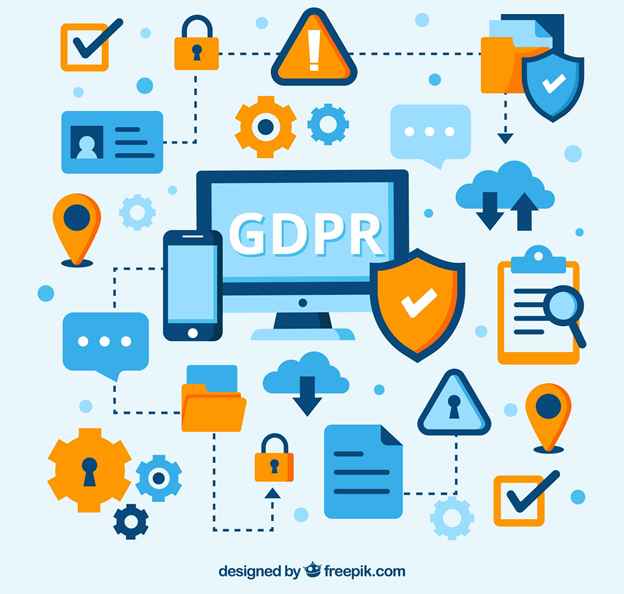How GDPR Impacts AI

Artificial intelligence technology is taking the world by storm. According to research from Markets and Markets, the AI market is set to become a $190 billion industry by 2025. However, artificial intelligence technology depends on using data while marketing technology is mostly concerned with crunching internet user data. The The EU General Data Protection Regulation (GDPR) came into effect in May 2018, bringing with it a massive impact on all companies using data that affect EU citizens. Since the inception of GDPR, this practice of collecting consumer data will no longer be easily feasible.
The big players have already been hit with relatively huge fines. For example, Google was fined around $57 million for not disclosing how they collect user data across their services for the purposes of presenting personalized advertisements. This clearly shows GDPR is nothing to mess around with. The article 22 of the regulation states users will not be subject to solely automated decision making. Therefore, AI tech developers and GDPR officials will have to start making some compromises.
GDPR vs Data Collection
GDPR makes it harder and more expensive to collect consumer data. This will especially take a toll on smaller companies trying to develop AI systems. Small businesses don’t have huge streams of first-party data coming in as their customer base is already limited. Large companies have huge amounts of existing customer data at their disposal which makes getting consent a lot easier.
Article 22 of the GDPR reveals that businesses must obtain and record explicit consent from all customers involved in data collection. This pertains to data processing directly affecting the customer such as workplace monitoring, e-recruiting and credit card applications. For these purposes, GDPR will significantly reduce the effectiveness of AI systems. Conversely, it will increase the protection of customer data as well. Recital 47 of the GDPR is concerned with AI detection of cyber threats, which further encourages investment in AI cybersecurity.
Privacy and Blockchain
Under GDPR, entities are required to adopt all crucial cybersecurity measures and must practice internal human IT-hygiene at all times. As human skills and technologies advance, organizations are starting to adopt cybersecurity measures more readily. And as AI and machine learning evolve, automation will become an amplifier of human intelligence. For now, AI tech still requires human assistance, especially because the technology is available to cybercriminals and hackers.
GDPR requires companies to increase the trust between the organization and its employees, partners and customers. Conveniently, blockchain technology uses blocks to organize data and works as an append-only structure which makes any attempts at modifying information clearly visible. Consequently, anyone using blockchain can see exactly how their information is being used. This will allow anyone to take action whenever there is any suspicious activity. Blockchain and AI may just be the perfect combo for enhancing data privacy.
Finding a Compromise
Under the GDPR, individuals have the right to reject their information being managed by automated processes. Nevertheless, this kind of technology is already here. Machines can make decision calls based on machine learning, while the human decides which things to automate. So the human is still responsible for the final decision. AI and ML might seem like the perfect solutions for resolving GDPR challenges, but the real challenge is explaining to regulators how the systems manage sensitive data.
The best scenario would be making a compromise between man and machine. This means the AI technology would apply automated decisions but still require human action. The human would be automating the action and not the decision. The human would also determine data management rules for the AI system to follow. Consequently, we would use the technology but we would tell it what to do. Basically, it would be automation with human oversight.
Personal Information and GDPR
Personal data is at the basis of GDPR as it identifies a natural person in any format. It regulates the data and content being stored by organizations. It states that data and content cannot be kept forever and proposes better information governance and records management. And this is the real challenge when it comes to GDPR compliance. Because information is stored within documents, companies are utilizing cognitive robotic process automation for data management. This is a combination of cutting edge tech such as data analytics, NLP, AI, ML and serves as a substitution for human actions.
But one of the reasons for the introduction of GDPR is to limit the way in which these technologies will parse data. GDPR will not stop the development of this important tech, but will serve to enhance their security. It will ensure they are used while taking privacy concerns into consideration. Under GDPR, individuals have the right to get an insight into how the decision was made as well as the right to human review. The regulation simply reflects the concerns many of us have with automated systems and works along the technology to develop secure and reliable AI.
GDPR Will Enhance the Security of AI Tech
Artificial intelligence is one of the new and exciting technologies that will make a profound impact on every industry. It is a way for us to stop doing robotic tasks and focus on making the world a better place. However, we must not get ahead of ourselves and focus only on the development of technology. We must think of data privacy too and that’s where GDPR steps in to save the day.
GDPR requires companies to get explicit consent from data subjects, otherwise they might be in danger of getting fined. This means marketers have to think of more transparent and secure ways of collecting user data. Blockchain technology is proving to be an excellent tool for achieving transparency and should not be neglected as such. For now, AI data management still requires human intervention, at least until the technologies at our disposal become secure enough.

